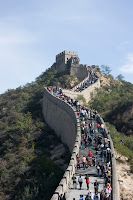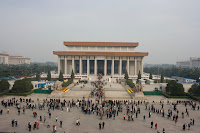
We arrived in Guilin at about 1:30 in the afternoon, after a flight of about an hour. The train, for some reason known only to God and a few Chinese transit officials, takes 24 hours. We had booked a hotel, which sent a car to pick us up, driven by a hustling tour agent named Jerry.
Guilin is by Chinese standards a small town, which means that it is about the size of San Jose. It's also a big tourism destination for Chinese, a matter of rice paddies, caves, and river trips. It's also reputed to be filled with scam artists and pickpockets. Still, Jerry was friendly and well spoken, and he soon talked us into using his company to arrange our boat and bus tours. The combined rate was a little less than we'd expected from the Lonely Planet.
The next morning found us sipping good McDonald's coffee in our hotel. We were waiting for a van to pick us up so we could see the Dragon's Neck Rice Paddies, a curious feat of agricultural engineering worth seeing, apparently. Our appointed time went by and we grew more nervous.
As seasoned travelers, we'd been scammed before, but we felt Jerry was an extraordinarily gifted con artist if he was one. He had even, while driving us, handled a personal call from a South African tourist client who wondered if she should take a pee before entering a particular cave. "No, there's no toilet inside," he said. "You should go before you enter." Now that's service.
Luckily, he'd given us a card with his number on it. We went to our hotel desk and had the girl give him a call. For a few anxious minutes we waited--he had told me he played badminton, I remembered. How many badminton-playing swindlers could the world possibly contain? After a moment, the hotel girl's face brightened and she handed me the phone. "They didn't pick you up?" Jerry asked. "No problem," he said, "I'll fix it."
What followed next was something we'll call the Great Taxi Chase. The girl from the hotel took some instructions from Jerry and piled us into a taxi. And off we went, barreling down the road as fast as we could to catch up with our tour bus, which was well on its way out of town. I don't know if you've ever been in a Chinese taxi, but under ordinary circumstances, it's not for the faint of heart. In the United States, Asians have a reputation for being over cautious, plodding, and absentminded drivers. In China, they combine a NASCAR-like love of speed with aggressive road rage. Add in a driver promised a good tip for catching a bus, and you have a great recipe for angina.
In any case, we soon overhauled our bus and hopped on. Now that we could enjoy it, we noticed that the countryside outside Guilin featured high rounded peaks that drop precipitously onto yellow rice paddies. It was harvest time, and they were dotted with neat grids of drying sheaves, punctuated by groves of orange and pomelo trees, and flat mats covered with drying seeds.
Our bus soon wound into the mountains, switching back up between terraced fields and traditional Chinese farmhouses. Then we reached our first stop: a dreadful tourist trap of a town with women who grew their hair out to one meter lengths—a feat available to Nicole should she ever feel the need. For about $7 per person, they performed a "hair show" during which they combed and coiffed themselves to the caterwauling of what sounded like fifty cats in heat. Nicole and I excused ourselves; the rest of our party wished they had.
After that, we piled onto a different bus and shot up to the rice paddies, which you can see from the photo. They are quite curious, sitting as they do so high up, and capable of capturing and holding water. Still, the excitement only lasts about an hour and we were soon headed back to Guilin.
If you're ever in Guilin, Jerry's full name is Jerry Weng, and he works for the CITS travel agency. He's worth his weight in gold.

















































